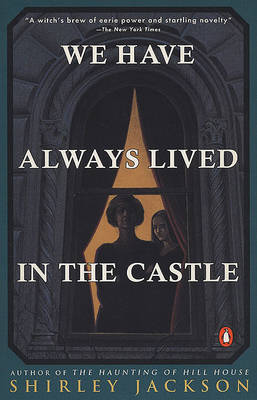Reviewed by thepunktheory on
Book vs. Movie:
I’m still not 100% sure how I feel about this. I can definitely say that I liked the movie better than the novel, but I wasn’t too much into either, to be honest. I know many people love Shirley Jackson’s books but so far, their charm seems to elude me. This is the second novel of hers that I read, and once more I am intrigued by the idea, but the execution just doesn’t hit the spot for me. Maybe it’s simply that her writing style doesn’t work for me. Because, by all means, I should have loved this book. Quite often the main character is such a mood! But ultimately, I ended up finding her irritating and annoying in the novel and wished we wouldn’t spend so much time in her head/her thoughts.
I was, however, really curious how this would turn out on screen. The story has the potential for a great adaptation (and Sebastian Stan’s in it), so I had to check that out as well. First of all, I immediately liked the film better, precisely because of what I said just before. We don’t spend so much time with Merricat’s thoughts. Also, in the book, it struck me as odd that everybody in the village would have such a deep-rooted hate for the sisters. In the movie, there were at least tiny attempts in giving some characters a reason to dislike them (e.g. a guy who was rejected by her sister). Another thing that the adaptation does a better job with is Charles. I get what Shirley Jackson wanted to accomplish there, what kind of person he is, his character. Maybe it’s just Sebastian Stan, but in the film, this character seems so much more intense, and also so much more charming. I can see why Constance would fall for him. In the book, he just seemed like an utter twat every single minute of every day.
While, overall, the adaptation kept fairly close to the book except for minor changes, there is one major plot divergence at the end. SPOILERS AHEAD
In the novel, Charles returns but the sisters simply ignore him. Somehow that felt rather anticlimactic, and I kept waiting for more to happen. I know that’s definitely a me problem, and most likely due to the movies and shows, I’m familiar with. So, it came as no surprise when in the movie things work out a bit differently. Here, Charles, upon being ignored, breaks into the house and Merricat bludgeons him to death. First of all, this was satisfying to watch considering what a piece of shit Charles was. Moreover, it felt a lot more intense than the book counterpart and I simply liked it better. It seemed to fit the story really well, just like how the mystery surrounding the sister was treated a bit differently in the adaptation than it was in the book. I got the impression that Merricat had poisoned everybody fairly early on – that is, once we learn of that fateful night. However, Jackson does take her time skirting around the subject to a point where it almost got frustrating. It’s almost as if the novel kept acting deliberately obtuse for lack of a better way to put this. Again, just something small that worked better in the on-screen version for me.
But, as I mentioned, the movie still is very close to its literary source material. That means, the film is also very weird, irritating, and just very odd. I think the bits I could criticize about the adaptation are mostly things I already didn’t love about the novel. So, I feel like I can’t fault them for that. As for all the changes, tiny as well as bigger, I wasn’t mad about any of them. In fact, most of the time they seemed to improve the story for me.
Reading updates
- Started reading
- 12 December, 2021: Finished reading
- 12 December, 2021: Reviewed
